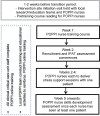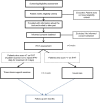Psychological Outcomes following a nurse-led Preventative Psychological Intervention for critically ill patients (POPPI): protocol for a cluster-randomised clinical trial of a complex intervention
- PMID: 29439083
- PMCID: PMC5879925
- DOI: 10.1136/bmjopen-2017-020908
Psychological Outcomes following a nurse-led Preventative Psychological Intervention for critically ill patients (POPPI): protocol for a cluster-randomised clinical trial of a complex intervention
Abstract
Introduction: Acute psychological stress, as well as unusual experiences including hallucinations and delusions, are common in critical care unit patients and have been linked to post-critical care psychological morbidity such as post-traumatic stress disorder (PTSD), depression and anxiety. Little high-quality research has been conducted to evaluate psychological interventions that could alleviate longer-term psychological morbidity in the critical care unit setting. Our research team developed and piloted a nurse-led psychological intervention, aimed at reducing patient-reported PTSD symptom severity and other adverse psychological outcomes at 6 months, for evaluation in the POPPI trial.
Methods and analysis: This is a multicentre, parallel group, cluster-randomised clinical trial with a staggered roll-out of the intervention. The trial is being carried out at 24 (12 intervention, 12 control) NHS adult, general, critical care units in the UK and is evaluating the clinical effectiveness and cost-effectiveness of a nurse-led preventative psychological intervention in reducing patient-reported PTSD symptom severity and other psychological morbidity at 6 months. All sites deliver usual care for 5 months (baseline period). Intervention group sites are then trained to carry out the POPPI intervention, and transition to delivering the intervention for the rest of the recruitment period. Control group sites deliver usual care for the duration of the recruitment period. The trial also includes a process evaluation conducted independently of the trial team.
Ethics and dissemination: This protocol was reviewed and approved by the National Research Ethics Service South Central - Oxford B Research Ethics Committee (reference: 15/SC/0287). The first patient was recruited in September 2015 and results will be disseminated in 2018. The results will be presented at national and international conferences and published in peer reviewed medical journals.
Trial registration number: ISRCTN53448131; Pre-results.
Keywords: Critical care; ICU; Intensive care; PTSD; mental health; psychological intervention.
© Article author(s) (or their employer(s) unless otherwise stated in the text of the article) 2018. All rights reserved. No commercial use is permitted unless otherwise expressly granted.
Conflict of interest statement
Competing interests: None declared.
Figures
References
-
- ICNARC. Key statistics from the Case Mix Programme — adult, general critical care units, 2017. https://www.icnarc.org/DataServices/Attachments/Download/a30185e2-0e19-e... (accessed 23 Nov 2017).
-
- Wade D, Hardy R, Howell D, et al. . Identifying clinical and acute psychological risk factors for PTSD after critical care: a systematic review. Minerva Anestesiol 2013;79:944–63. - PubMed
Publication types
MeSH terms
Associated data
Grants and funding
LinkOut - more resources
Full Text Sources
Other Literature Sources
Medical



